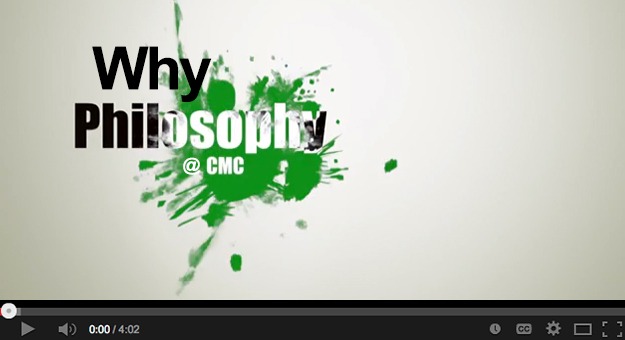Philosophy
What is Philosophy?
Philosophy is the study of some of the deepest questions human beings have ever asked: What is the right ethical code to live by? What political policies should I support? How can I find true happiness? Does God exist? Are human beings immortal? Do human beings have free will? What are the limits of human knowledge?
The study of philosophy exposes students to classic texts and fundamental ideas. More importantly, it teaches students how to analyze problems, construct systematic arguments, develop their own viewpoints, and communicate their thoughts clearly and effectively.
Because of these effects, philosophy helps students achieve two of their most important goals. First, philosophy is a central discipline in the traditional liberal arts, and students who study philosophy get a rigorous liberal arts education. Second, philosophy is practical. Because philosophy teaches students how to analyze difficult problems, philosophy majors almost always have the highest scores on any graduate school exam (MCAT, LSAT, GMAT, GRE) apart from hard science majors. Students who graduate with a degree in philosophy pursue further study and careers in business, public affairs, law, and many other fields.
The philosophy program benefits from collaboration with all the Claremont colleges.
Why Philosophy?
Students often ask why they should study philosophy. There are several good reasons:
- Philosophy is the study of some of the deepest questions human beings have ever asked: What is the right ethical code to live by? What political policies should I support? How can I find true happiness? Does God exist? Are human beings immortal? Do human beings have free will? What are the limits of human knowledge? Majoring in philosophy allows you to spend four years pursuing these fascinating questions.
- The goal of a traditional liberal arts education is to prepare students to face the most difficult tasks of life, including finding happiness, setting goals, and living ethically. The study of philosophy is central to this mission. Philosophy teaches students how to analyze problems, construct systematic arguments, and develop their own viewpoints on life's most important questions.
- Many CMC students are particularly interested in leadership and politics. But many CMC students overlook the fact that great leaders aren't merely people with power. Instead, true leaders, like Paine, Gandhi, and King, guide society toward its ultimate goals of happiness, morality, and understanding. Philosophy prepares students for true leadership-the kind that makes a lasting difference to society.
- Philosophy is practical. Apart from hard science majors, philosophy majors almost always have the highest scores on any graduate school exam (e.g., MCAT, LSAT, GMAT, GRE). The reason philosophy majors do so well is that philosophy teaches you to think about the hardest problems human beings have ever uncovered. Students who graduate with a degree in philosophy pursue further study and careers in business, public affairs, law, and many other fields.
Paul Hurley
Department Chair, Kravis Center 284
Claremont McKenna College
850 Columbia Avenue
Claremont, CA 91711
[email protected]
Dorlisa Tillman
Faculty Support Coordinator, Philosophy Faculty Support West
Claremont McKenna College
850 Columbia Avenue
Claremont, CA 91711
(909) 607-8019
[email protected]
Follow the CMC Department of Philosophy on Facebook and Twitter

